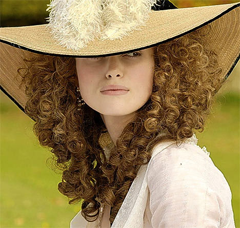
Try to imagine the horror of life before modern athletic apparel. The Duchess, an 18th century costume drama starring the exquisite Keira Knightley, wastes no time in making such horrors real -- it begins with a footrace run by gentlemen wearing pantaloons and waistcoats, with cravats swaddling their sweaty necks. Thus, our theme: In an age of decorum, in a time before Nike, can passion escape the tight wrappings of convention?
Of course, it's the women who are really bound tight here, both sartorially and socially. Loosely based on the book by Amanda Foreman, The Duchess tells the true-ish story of lovely young Georgiana Spencer (Knightley), a well-born Englishwoman (and ancestor of Diana, Princess of Wales) coming of age in the too-exciting era when first the American colonies and then the French peasantry were heading towards revolution. G, as she is fondly called, is not at all dismayed when her mother (Charlotte Rampling) matches her to the stiff old Duke of Devonshire (Ralph Fiennes). Rather, she is appropriately thrilled at the fantastic match, although the comely teenager wrongly presumes that the greying duke has fallen madly in love with her as opposed to her child-bearing potential.
The new Duchess of Devonshire soon discovers that if the duke had married for love, he would have married his hounds. Not only is the wedding night like a doctor's appointment, the duke is, as Georgina informs her mother, "not interested in anything." Except the housemaids -- his interest there is sufficient to produce a little surprise for Georgina to look after.
All too smooth
Eventually the duchess has three daughters, two from her own efforts. None of them mean beans to the duke, who only wants a son and heir as part of his marriage contract. Meanwhile, the duchess has leveraged her prominent position to become a beacon of society with her trend-setting style and political smarts, all of which she uses to aid young politician Charles Grey (Dominic Cooper), who has loved the duchess since the days when he ran footraces for her in a tightly-bound cravat. Things get more complicated with the arrival of Lady Elizabeth Foster (Hayley Atwell). Bess first befriends the duchess and later the duke, leading to a very awkward living arrangement indeed. It's a big quasi-historical soap opera, complete with wigs higher than the Pope's hat. One of them even catches fire.
Knightley's duchess is quite a woman. In an era when pregnancies were often fatal, she comes through at least six of them without gaining a pound or a wrinkle. According to Foreman's book, the real duchess was a more complicated, more troubled, and more fascinating figure. But director Saul Dibb and his co-screenwriters succumb to the usual temptation to make Georgiana thoroughly admirable, spunky, and downright saintly, if admittedly passionate. We are shown her penchant for gambling, but not that the real-life duchess gambled herself into crippling debt. We see her watching a performance of the infamous play "School for Scandal," but are given few clues as to why the real-life duchess was a model for the play's heroine.
Prince Charles foreshadowed?
As for the duke, he's a puzzle to his wife and to us. He is meant to be something more than a caricature of the cold-fish husband -- after all, he has no trouble getting excited for housemaids and Lady Bess -- but the character manages to come off as both mystifying and underwritten. Why doesn't his gorgeous wife turn his noble crank? Why is he described as "the only man in England not in love with his wife?" We never get any clue. Perhaps we are supposed to see in him the forerunner of Prince Charles and leave it at that. For that matter, perhaps we are not told of the duchess's gambling debts because they are not a proper metaphor for the paparazzi.
In the end, The Duchess is certainly watchable -- Knightley alone guarantees that -- but not particularly involving. It's certainly no tragedy, if that's what was intended. These are high-born people dealing with the conventions and constraints of their time, mores with which they were well-acquainted. It's a shame Dibb doesn't seem to share the duchess's interest in politics -- the film might have been more interesting if tales of the duchess's private affairs had been augmented with more of the late 18th century public affairs she apparently found so fascinating.
Related Tyee stories:
- Let's Get Our Own King and Queen
Peter and Autumn will do just fine. - Royal Pains
'The Queen' and all her kooky clan, even the corgis. - YouTube's New Royalty
It used to be the voice of the people. Not anymore?
Read more: Film
















Tyee Commenting Guidelines
Comments that violate guidelines risk being deleted, and violations may result in a temporary or permanent user ban. Maintain the spirit of good conversation to stay in the discussion.
*Please note The Tyee is not a forum for spreading misinformation about COVID-19, denying its existence or minimizing its risk to public health.
Do:
Do not: